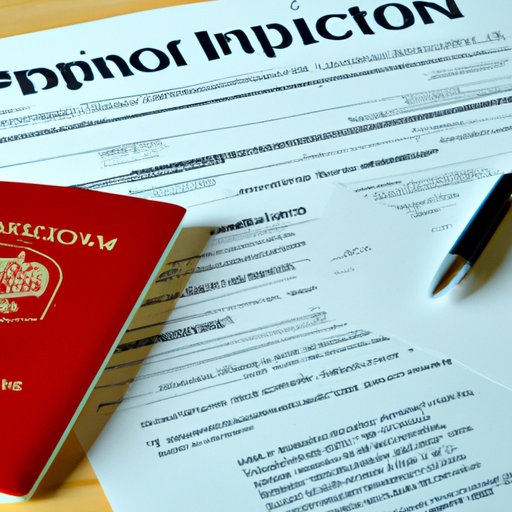Introduction
For individuals with a criminal record, traveling to Canada can be a complicated process. Before attempting to cross the border, it’s important to understand Canadian immigration laws regarding visas for felons. This article will explore the legal requirements and restrictions for felons traveling to Canada.
Examining the Impact of a Criminal Record on Cross-Border Travel to Canada
Individuals with a criminal record are subject to additional scrutiny when they attempt to enter Canada. According to Canada’s Immigration and Refugee Protection Act, “a foreign national is inadmissible to Canada on grounds of serious criminality for having been convicted of an offence outside Canada that, if committed in Canada, would constitute an indictable offence under an Act of Parliament.”
This means that if you have been convicted of a crime outside of Canada, you may not be allowed to enter the country. Even if your offense was minor, such as a traffic violation or possession of a small amount of marijuana, you may still be denied entry. Depending on the nature of the offense and the length of time since conviction, a visa may be required for entry.
Understanding Canadian Immigration Laws Regarding Visas for Felons
In general, individuals with a criminal record are considered inadmissible to Canada. However, there are certain exceptions to this rule. If you have a criminal record, you may still be able to enter the country if you meet certain eligibility requirements and obtain a visa or other authorization.
The first step in determining if you are eligible to enter Canada is to contact the nearest Canadian embassy or consulate. They will be able to provide information about the specific laws and regulations that apply to your situation. Additionally, they can provide guidance on the steps you need to take in order to be granted entry.
Investigating the Rights and Restrictions for Felons Seeking Entry into Canada
If you have a criminal record, you may be able to enter Canada by applying for a Temporary Resident Permit (TRP). A TRP allows individuals to enter Canada for a specified period of time, typically up to three years. To be eligible for a TRP, you must demonstrate that your visit is justified and that you do not pose a risk to the safety and security of Canadians.
If you are granted a TRP, you must follow all conditions set by the Canadian government. These conditions may include restrictions on your activities, such as where you can go and what type of work you may do. Additionally, you may be required to undergo regular medical examinations, provide proof of identity, and report any changes in your circumstances.
Exploring Eligibility Requirements
When applying for a TRP, it’s important to understand the eligibility requirements. You must demonstrate that your visit is justified, which usually requires providing evidence that your presence in Canada is essential for business, family, or humanitarian reasons. Additionally, you must demonstrate that you do not pose a risk to the safety and security of Canadians.
To be eligible for a TRP, you must also meet certain criteria. You must have a valid passport, have no outstanding criminal charges, and have a clean bill of health. Additionally, you must not have been previously refused entry to Canada or deported from the country.

Examining Potential Waivers and Alternatives
If you are unable to meet the eligibility requirements for a TRP, there may be alternative options available. You may be able to apply for a criminal rehabilitation, which may allow you to enter the country without a TRP. In some cases, you may also be able to apply for a special authorization or waiver. Each of these options has its own set of rules and regulations, so it’s important to research your options carefully before making a decision.

Analyzing the Factors that Determine if a Felon Can Enter Canada
When determining if a felon can enter Canada, several factors come into play. The most important factor is the severity of the offense. Generally speaking, more serious offenses are considered more likely to lead to denial of entry. Additionally, the length of time since the conviction and the individual’s criminal history will also be taken into consideration.
It’s also important to consider the individual’s rehabilitation and good character. If the individual has made efforts to reform their behavior and live a law-abiding life, they may be more likely to be granted entry. Finally, the individual’s ties to Canada, such as family, employment, or study, may also be considered.

Exploring the Benefits of Applying for a Temporary Resident Permit for Felons Traveling to Canada
Applying for a TRP is one way for felons to travel to Canada. A TRP allows individuals to enter Canada for a specified period of time, and it can often be extended if necessary. Additionally, a TRP can help to establish a positive relationship with Canadian authorities, which may make it easier to enter the country in the future.
When applying for a TRP, it’s important to understand the application process. You must complete the appropriate forms and submit them to the Canadian embassy or consulate. Additionally, you must provide supporting documents, such as a valid passport and proof of identity. Once your application is approved, you will be issued a TRP and will be able to enter Canada.
Conclusion
Traveling to Canada as a felon can be a complex process. It’s important to understand the legal requirements and restrictions that apply to your situation. Generally speaking, individuals with a criminal record are considered inadmissible to Canada. However, there are certain exceptions to this rule, such as applying for a Temporary Resident Permit. Additionally, there may be other options available, such as criminal rehabilitation or a special authorization or waiver. Ultimately, the decision whether or not to grant entry will depend on the individual’s criminal history and other factors.
(Note: Is this article not meeting your expectations? Do you have knowledge or insights to share? Unlock new opportunities and expand your reach by joining our authors team. Click Registration to join us and share your expertise with our readers.)
